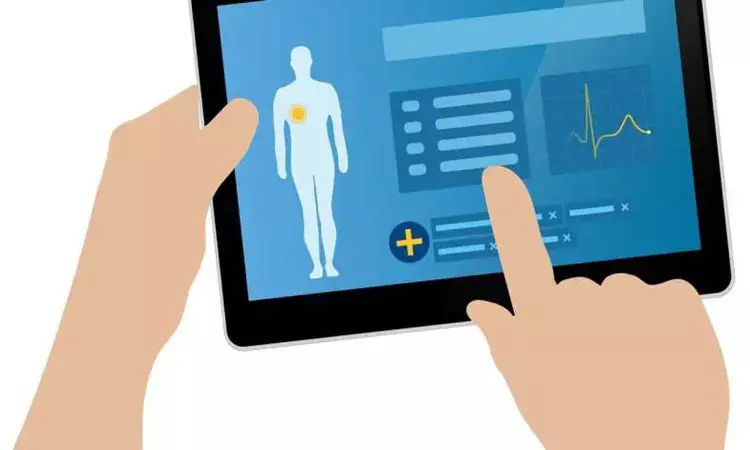- Home
- Medical news & Guidelines
- Anesthesiology
- Cardiology and CTVS
- Critical Care
- Dentistry
- Dermatology
- Diabetes and Endocrinology
- ENT
- Gastroenterology
- Medicine
- Nephrology
- Neurology
- Obstretics-Gynaecology
- Oncology
- Ophthalmology
- Orthopaedics
- Pediatrics-Neonatology
- Psychiatry
- Pulmonology
- Radiology
- Surgery
- Urology
- Laboratory Medicine
- Diet
- Nursing
- Paramedical
- Physiotherapy
- Health news
- Fact Check
- Bone Health Fact Check
- Brain Health Fact Check
- Cancer Related Fact Check
- Child Care Fact Check
- Dental and oral health fact check
- Diabetes and metabolic health fact check
- Diet and Nutrition Fact Check
- Eye and ENT Care Fact Check
- Fitness fact check
- Gut health fact check
- Heart health fact check
- Kidney health fact check
- Medical education fact check
- Men's health fact check
- Respiratory fact check
- Skin and hair care fact check
- Vaccine and Immunization fact check
- Women's health fact check
- AYUSH
- State News
- Andaman and Nicobar Islands
- Andhra Pradesh
- Arunachal Pradesh
- Assam
- Bihar
- Chandigarh
- Chattisgarh
- Dadra and Nagar Haveli
- Daman and Diu
- Delhi
- Goa
- Gujarat
- Haryana
- Himachal Pradesh
- Jammu & Kashmir
- Jharkhand
- Karnataka
- Kerala
- Ladakh
- Lakshadweep
- Madhya Pradesh
- Maharashtra
- Manipur
- Meghalaya
- Mizoram
- Nagaland
- Odisha
- Puducherry
- Punjab
- Rajasthan
- Sikkim
- Tamil Nadu
- Telangana
- Tripura
- Uttar Pradesh
- Uttrakhand
- West Bengal
- Medical Education
- Industry
Nutrition important for reducing mortality after TAVR in elderly: Circulation

Spain: Elderly patients who remain at nutritional risk after TAVR have a higher risk of mortality and heart failure hospitalization (HF-h), finds a recent study in the journal Circulation: Cardiovascular Interventions. While, changing from malnutrition risk to non-nutritional risk reduced the risk of mortality and HF-h by half.
This remains to be seen whether patients with nutritional risk would benefit from pre-TAVR and post-TAVR nutritional interventions, wrote the authors.
Not much data is available regarding the change in the nutritional status after transcatheter aortic valve replacement (TAVR). Diego López Otero, Health Research Institute of Santiago de Compostela (IDIS), and CIBERCV, Spain, and colleagues, therefore, evaluated the the prognostic impact of the change in the geriatric nutritional risk index following TAVR.
TAVR patients were analyzed in a prospective and observational study. To analyze the change in nutritional status, geriatric nutritional risk index of the patients was calculated on the day of TAVR and at 3-month follow-up. The impact of the change in nutritional risk index after TAVR on all-cause mortality, heart failure hospitalization (HF-h), and the composite of all-cause death and HF hospitalization was analyzed using the Cox Proportional Hazards model.
For the purpose, the researchers analyzed TAVR patients in a prospective and observational study. For analyzing the change in nutritional status, the researchers calculated geriatric nutritional risk index of the patients on the day of TAVR and at 3-month follow-up.
The impact of the change in nutritional risk index after TAVR on all-cause mortality, heart failure hospitalization (HF-h), and the composite of all-cause death and HF hospitalization was analyzed using the Cox Proportional Hazards model.
A total of 433 patients were included in the study.
Key findings of the study include:
- After TAVR, 68.4% (n=182) patients with baseline nutritional risk improved compared with 31.6% (n=84) who remained at nutritional risk.
- The change from no-nutritional risk to nutritional risk after TAVR occurred in 15.0% (n=25), while 85.0% (n=142) remained without risk of malnutrition.
- During follow-up, 157 (36.3%) patients died and 172 patients (39.7%) were hospitalized due to HF.
- Patients who continued to be at nutritional risk had a higher risk of mortality (hazard ratio [HR], 2.10), HF-h (HR, 1.97), and the composite of death and HF-h (HR, 2.0).
- The change to non-nutritional risk after TAVR significantly impact mortality (HR, 0.48), HF-h (HR, 0.50), and the composite outcome (HR, 0.44).
"From our perspective, these results are interesting as it can raise concerns about whether pre-TAVR and post-TAVR nutritional interventions could improve the prognosis of TAVR patients. In addition, this makes it important to emphasize that it is necessary to incorporate the nutritional screening as a component of frailty assessment in the selection of patients who are candidates for TAVR," wrote the authors.
"Further studies are needed to identify whether patients at nutritional risk would benefit from nutritional intervention during processes of care of TAVR programs," they concluded.
The study titled, "Prognostic Impact of Change in Nutritional Risk on Mortality and Heart Failure After Transcatheter Aortic Valve Replacement," is published in the journal Circulation: Cardiovascular Interventions.
DOI: https://www.ahajournals.org/doi/abs/10.1161/CIRCINTERVENTIONS.120.009342
Dr Kamal Kant Kohli-MBBS, DTCD- a chest specialist with more than 30 years of practice and a flair for writing clinical articles, Dr Kamal Kant Kohli joined Medical Dialogues as a Chief Editor of Medical News. Besides writing articles, as an editor, he proofreads and verifies all the medical content published on Medical Dialogues including those coming from journals, studies,medical conferences,guidelines etc. Email: drkohli@medicaldialogues.in. Contact no. 011-43720751


